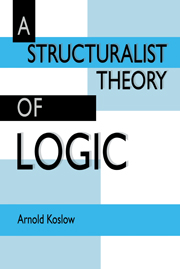Book contents
- Frontmatter
- Contents
- Preface
- Part I Background
- Part II Implication relations
- Part III The logical operators
- Part IV The modal operators
- 25 Introduction
- 26 Modality
- 27 Modals: Existence and nonextensionality
- 28 Special modals
- 29 The possibility of necessity-style modals
- 30 Modals revisited I
- 31 Quantification and modality
- 32 Modals revisited II
- 33 Knowledge, truth, and modality
- 34 The comparative strength of modals
- 35 Kripke-style systematization of the modals without possible worlds
- 36 Model functions, accessibility relations, and theories
- 37 Migrant modals
- Appendix A An implication relation for the integers in the programming language BASIC
- Appendix B Symmetric sequents as products of implication relations and their duals
- Appendix C Component-style logical operators and relevance
- Notes
- Bibliography
- Index
29 - The possibility of necessity-style modals
Published online by Cambridge University Press: 05 May 2010
- Frontmatter
- Contents
- Preface
- Part I Background
- Part II Implication relations
- Part III The logical operators
- Part IV The modal operators
- 25 Introduction
- 26 Modality
- 27 Modals: Existence and nonextensionality
- 28 Special modals
- 29 The possibility of necessity-style modals
- 30 Modals revisited I
- 31 Quantification and modality
- 32 Modals revisited II
- 33 Knowledge, truth, and modality
- 34 The comparative strength of modals
- 35 Kripke-style systematization of the modals without possible worlds
- 36 Model functions, accessibility relations, and theories
- 37 Migrant modals
- Appendix A An implication relation for the integers in the programming language BASIC
- Appendix B Symmetric sequents as products of implication relations and their duals
- Appendix C Component-style logical operators and relevance
- Notes
- Bibliography
- Index
Summary
The Montague lesson
Before we consider a host of examples of modal operators that draw upon traditional as well as nontraditional sources, we should say something about a bundle of theorems due to Montague (1963). The import of his results seems to be that syntactic treatments of modality for sufficiently rich languages are in deep trouble. It is true, of course, that our characterization of modality is not syntactical and is not restricted to structures that are syntactical. Nevertheless, it is worth looking at his results, for it might happen that there will be analogues to them that could create trouble for the more general account that we have been developing. It might just be that even when modals are taken as operators (so that modals of sentences are just certain kinds of functions that map sentences to sentences), analogues or counterparts to Montague's theorems might still hold.
By a syntactical characterization of modality Montague seems to have had in mind the idea that “□” or “N” (his notation) is predicated of sentences [i.e., N(┌A┐), rather than prefixed to the sentence itself as NA, as it would be were “N” regarded as a connective].
Consider one of Montague's theorems. It is the counterpart of the Tarski result that certain kinds of formal languages are inconsistent if they contain their own truth predicate and the diagonalization lemma is provable for the predicates of that language.
- Type
- Chapter
- Information
- A Structuralist Theory of Logic , pp. 290 - 300Publisher: Cambridge University PressPrint publication year: 1992



